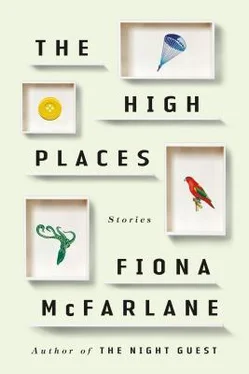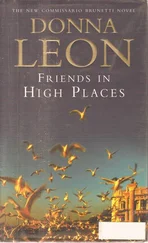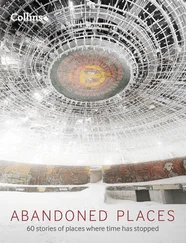‘Open your eyes,’ said Miss Lewis. The children lifted their heads into the burden of their love for Joseph. They smiled and squirmed and began to guess: Phoebe, Ruby, Usha, Archie, Blake. Joseph turned toward every name as it was called, as if waiting to see who might produce the Button. Liam S, Bella, Jackson, Xin. Twenty names, and twenty hands falling open. Only Jyoti remained. She stood with her rigid hands, with her desperate smile, with her socks slipping. No one wanted to say her name. They wanted her to give herself up. Miss Lewis, too, wanted Jyoti to give herself up. Eventually Ramon said, ‘Jyoti.’
Jyoti opened her empty hands.
The circle laughed. Miss Lewis had found that children, as a rule, didn’t like practical jokes. There was a certain kind of laughter that, in children, was a howl. Ramon took Jyoti’s wrists and inspected her hands. No one looked at Joseph, but they all saw Jyoti: the mole on her cheek, the dusty mark where she’d rubbed her shin with the heel of her shoe, the crookedness of her teeth. Jyoti might have been crying. Ramon threw her wrists down as if discarding them. Then every child save Joseph and Jyoti began to cry out, just as they’d done when they wanted to play Buttony. They stamped their feet and kicked at the grass. They shook their uniforms and looked up into the branches of the jacaranda tree, as if they might find the Button in these places. Their circle broke open as they shook and kicked and shouted, and faces appeared again in classroom windows.
Miss Lewis watched Joseph stand there with his mouth closed and his hands behind his back. Although the circle had broken, he still seemed to be in the middle of it. He was only a boy and he was alone and proud and terrible. Miss Lewis stepped away from the tree. She would order him to open his mouth and spit out the Button. She would make him say what he had done, how he had stood and watched the children guess; she would shame him, and the faces in the windows would see it.
But first she should settle the children. She clapped her hands five times in the rhythm that meant they must be quiet and copy her. They were quiet, but they didn’t copy her. She saw the way they looked at her; she saw their fury. Ramon came first, to pull at her pockets. Then Josie, who had lost a tooth that morning; her mouth was open as she searched the grass at Miss Lewis’s feet. Osea and Mimi scratched at the scabbed bark of the tree. Miss Lewis swatted and slapped, but the children still came. They opened her hands and dug in her elbows. Liam S squatted to peer up her skirt, and when she crouched to stop him, it was Jyoti who pulled the pins from her hair, as if the Button might be hidden in its roots. Now Miss Lewis cried out. She lifted her head and saw Mr Graham running from the 3A classroom. And Joseph was behind him, not quite running, not altogether, but like a shadow, long and blank and beautiful.
When I began my study of the colossal squid, I still believed in God. The squid seemed to me then, in those God days, to be the secretly swimming proof of a vast maker who had bestowed intelligence — surprisingly, here and there — on both man and mollusc. I’ve discussed this with Charles Darwin, who visits me most days, always a little out of breath. His cheeks are red, his hair white. He looks nothing like a ghost. He puts his feet up on the rocks and gazes out over this small corner of the Pacific, calm at sundown and partially obscured by a mosquito haze. We sit above the tree line and consider the movements of the colossal squid in her bay below. She moves this way and that; she floats and billows in the tide. She reminds me of my mother’s underwear soaking in a holiday basin. Her official name, her name in polite company, is Mesonychoteuthis hamiltoni . We’ve named her Mabel and together we plan to free her.
It’s no easy thing, this freeing of a colossal squid. It was difficult enough to imprison her in the first place. There is the issue of her size.
‘A colossal squid,’ I tell Darwin, ‘makes a giant squid look like a bath toy.’
He agrees with me, although as far as I know he has never seen either a bath toy or a giant squid. He remains surprisingly unexcited by my account of Mabel’s capture: the months-long hunt with smaller squid for bait, the boredom and fussy seasickness, Mabel emerging from the sea with her hood pink in the sudden sun. She flailed at the surface, she swam and sounded, smelling as much like the sea as anything I have ever smelled. But we hooked her, and we panicked her, and she raced ahead of us, right into this bay, through a narrow channel that we were able to block. And now she spends her days here, rotating among her many arms, and I spend my days watching her. They’re going to build her a facility, but first there’s money to raise and laws to change. For now it’s just the two of us — and Darwin.
Darwin first appeared on my 402nd day on the island. We often argue, but in a neutral, brotherly sort of way, and I appreciate his company. The sun sinks into the sea, but we also see it rise from the sea. This makes the world seem very small, even though we’re two hours from any town. There’s a Catholic school higher up the mountain and we see the girls walk down to the water and back up again. I hear their singing in the early morning and it surprises me; at sundown it makes me sad. Late in the afternoons they swim in the white sea — far out into the lagoon, where I often see bullet-shaped sharks. Darwin and I take turns peering through my binoculars. It’s an innocent and companionable lechery. Although he’s a ghost, he leaves sweat around the eyepieces.
I’ve been thinking for some time of taking one of the monthly supply boats back to New Zealand, then a plane home. At home the rain will be cold, pigeons will grow fat, there will be supermarkets. I’ve refused replacements and talked up the malarial solitude and now no one will come, not even over-eager graduate students with an itching for the Pacific. But this is my 498th day on the island, and lately I’m troubled by headaches and abrupt changes in temperature. There’s something feverish about this air. It’s not only the headaches, although they’re bad enough; my major symptom is a kind of vertigo, a frequent and sudden awareness that the universe is expanding out from me. This feeling begins with my feet, as if the ground — the planet — the galaxy — has suddenly dropped away from them and I’m floating untethered in space, only space doesn’t exist, and neither does my body. I can only describe the sensation as the suspension of nothing in nothing. But I look down and there are my feet, dirt-brown, and there are Darwin’s, sensibly shod. Below our feet swims Mabel. It’s only while watching Mabel that I feel tied to the earth once more and a sense of order is restored. Still, that moment of vertigo is briefly and terrifyingly glorious. It reminds me of the way, when I was younger, I used to feel my body respond to the singing of hymns: an interior fire, a constriction of the heart that I took for a visitation of the Holy Spirit. I never mentioned this sensation to anyone. Maybe other people feel it. Perhaps the schoolgirls on the mountain feel it, singing in their concrete church: the large feeling of singing toward something that sings back. I often wondered if sex felt that way, undernourished adolescent that I was. And now — the quiet sky, the patient waiting, the tick of time in the bones, until the world rushes out and the vanishing of the cosmos presents itself again, magnificent.
I’ve told Darwin of my troubles (he suspects malaria, which is possible; I stopped taking my meds on day 300, partly because of the dreams they gave me, bright crystal dreams of exhausting flight). Sitting here, atop our hot rock, we might be the last two survivors of the flood, chosen by Noah: a pair of scientists, two by two. But the ark broke up somewhere along the Line and left us stranded with a squid for company. Darwin regards me sadly when I say this, stroking his diluvian chin.
Читать дальше












